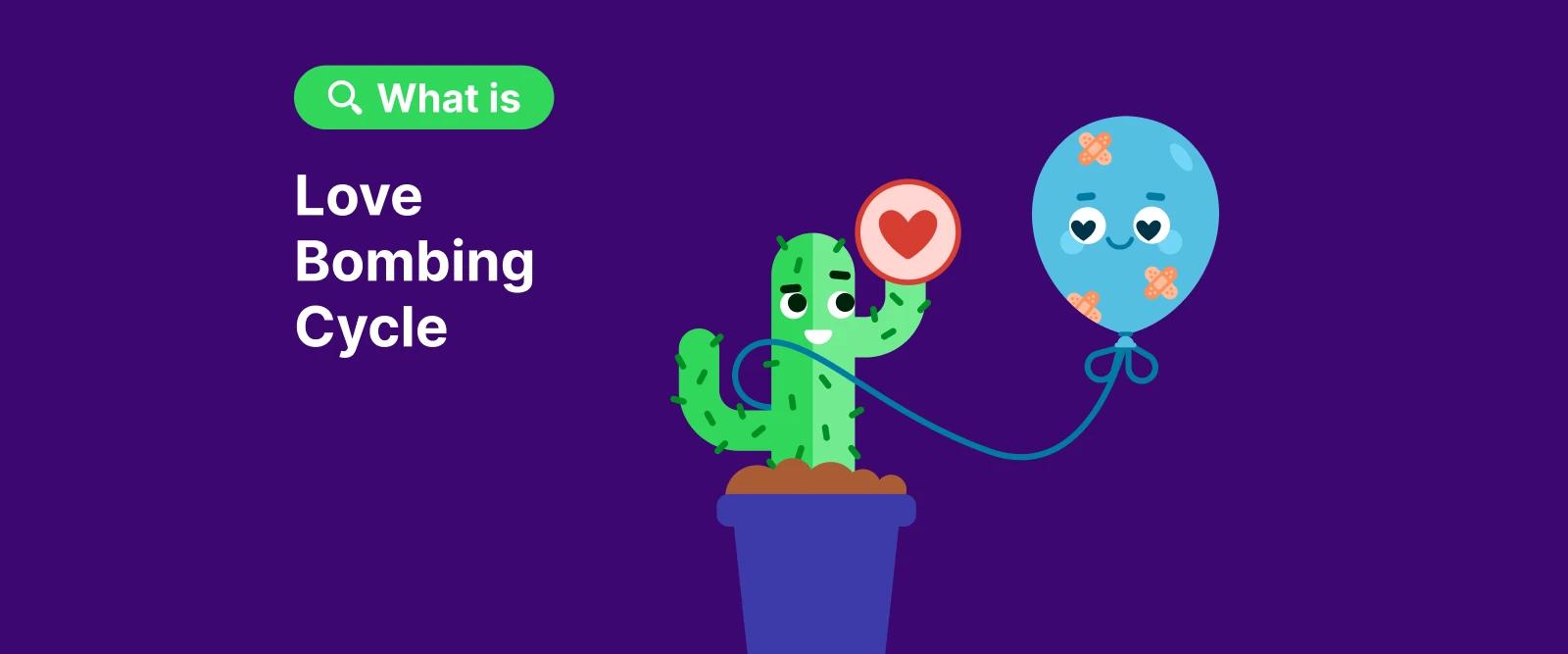Love bombing is a manipulative behavior involving overwhelming affection, attention, and gifts to gain emotional control over someone.
Often disguised as romance, love bombing cycle typically occurs in the early stages of a relationship. The affection may feel intoxicating at first, but it soon shifts into manipulation, control, and emotional imbalance.
My name is Dr. Suzanne Degges-White, and I am a licensed counselor with 20+ years of experience. In this article, I will explain what love bombing looks like, break down its psychological cycle, outline red flags to watch for, and provide strategies for emotional recovery.
For more reading suggestions and practical tips, download the Headway app and start your journey towards healing and personal growth!
Quick summary:
Love bombing is an emotional manipulation tactic that involves excessive affection early in a relationship to gain control.
Love bombing follows a pattern: idealization, devaluation, discard, and hoovering.
Watch for red flags, such as sudden declarations of love, excessive attention, and emotional withdrawal.
Now, let's take a closer look at what the love bombing cycle is.
📘 Decode the hidden phases of love bombing with Headway!
What is love bombing?
Love bombing is a term used to describe the practice of overwhelming someone with compliments or praise, over-the-top acts of adoration, and focused attention.
It's a behavior typically exhibited early in a relationship. While it may feel good at first, it soon becomes suffocating as the love bomber's behavior becomes increasingly manipulative and controlling.
The goal of love bombing is to lure someone into a relationship in order to take advantage of them once the manipulation takes effect.
Narcissistic love bombing is typically marked by intensity and high pressure – similar to the salesperson who warns potential buyers that if they don't commit now, the offer might not be available later.
However, there are stark differences between love bombers and people who just enjoy spoiling people they care about.
Love bombing is motivated by a desire to control another person, and there are typically hidden strings attached to the "bombs."
As the victim grows more compliant and the relationship becomes more oppressive, the love bombing comes to a halt.
In cases where genuine affection is the motivation for extravagant shows of affection, there is consistency and congruence between the tangible displays of affection and the way the recipient is treated.
📘 Spot the narcissist's trap before you fall in — get insights on Headway!
Understanding the love bombing cycle: Four key phases
Four phases have been identified in the love bombing cycle, reflecting the ways in which the relationship between the love bomber and their victim changes over time.
It's important to note that the love bomber controls the relationship through these phases unless the victim can make a complete escape.

1. Idealization phase
This is the opening love bombing phase in which the love bomber identifies a target, and the barrage begins. Overwhelming attention and affection are highlights of this phase, and due to its rapid pace, it can leave a person feeling "swept off their feet."
2. Devaluation phase
As the idealization phase begins to grow old for the love bomber, and their efforts at winning over their victim have been successful, the devaluation phase begins.
Shows of affection and acts of caring evaporate and are replaced by criticism and withdrawal from the relationship. They may show jealousy and mistrust and make false accusations against their victim.
Tactics like gaslighting — where the abuser distorts the victim's perception of reality — often surface to undermine their confidence and autonomy. They may also use physical abuse as a means to belittle their victims.
Learn why intense affection can be a red flag on Headway!
3. Discard phase
When the love bomber grows tired of their victim and, once engaging in criticism, abuse, or other forms of victim denigration, lose their appeal, the love bomber may abruptly end the relationship and simply abandon their victim, leaving them struggling to understand the breakup.
4. Hoovering
This final phase of the cycle reflects the manipulator's need to draw their prey back into their trap. They may begin efforts to re-engage their victim through a return to love bombing or through efforts to shame them into returning to the relationship.
Manipulators and narcissists can be extremely persuasive, and their prior success at luring in a particular victim feeds their egos enough to convince them they can do so again.
These four stages of the common cycle of abuse often play out more intensely when attachment insecurities are involved.
'Attached' explains how anxious and avoidant attachment styles can make us more vulnerable to cycles like love bombing and how understanding our attachment patterns can help us break free from unhealthy dynamics.
Real-life example: When affection feels too good to be true
As a therapist, I work with many clients dealing with relationship concerns. This was the case for Morgan, an ongoing client in the early stages of a new romantic relationship.
Morgan described the numerous ways that their new partner was showing them how much they cared.
They had just met a couple of weeks before our therapy session. Still, Morgan described receiving almost hourly texts during workdays, with them elaborating on how wonderful
Morgan was and how they couldn't wait for their next meeting. There were romantic dates at posh restaurants and even flower deliveries sent to Morgan's office — lavish grand gestures that felt both exciting and excessive for such a new relationship.
📘 Uncover the psychology behind emotional manipulation with Headway!
Morgan was definitely flattered to receive this "praise fest." The relationship felt like a modern fairytale, but she had some concerns bubbling up about the situation.
Not only were there frequent texts, but there were a couple of drop-in visits where the new partner showed up unexpectedly and uninvited.
They brought gifts and showed romantic gestures that seemed a little "extra" or over-the-top for where they were in their relationship.
Morgan admitted that the situation sounded like either the opening scenes of a romantic Hallmark movie or the start of a slasher horror flick. Morgan was starting to worry that it was the latter.
Morgan's experience reflects the emotional confusion many face when intense affection blurs into control.
If you want to explore these relationship gray areas further, 'Everything I Know About Love' by Dolly Alderton offers personal insights into love, heartbreak, and the search for self-worth amid romantic chaos.
📘 See through the charm and find the truth — start learning on Headway!
How to tell love bombing vs. genuine affection
Most people enjoy being admired by others and receiving compliments and special treatment.
However, if you're the object of affection from a love bomber or narcissist, the displays of attention might go overboard but not be congruent with their actions.
Being pursued can be seductive as love bombers leave you feeling as if you are the most special person in their life, and their adoration plays into the virtually universal need to be noticed and loved by others.
For many people, it can be hard to resist a love bomber during the earliest stages. Still, as the barrage of affection continues, red flags tend to pop up that leave you wondering if you're in a healthy relationship or dating a love bomber.
Love bombing takes a toll on the victim's mental health, and recognizing the cyclical pattern of love bombing can give you an idea of what the future might look like if the relationship continues.
Let's dive deep into the notion of love bombing and what the cycle of this behavior typically looks like.

How to recognize the first warning signs of love bombing
They say that love is blind, and it's true that being infatuated with someone new can cloud our vision.
And if that person is engaging in behaviors that make us feel special and adored, it can be especially difficult to recognize whether or not we're being love-bombed.
However, some signs suggest that a person's adoration may not be motivated by genuine affection.
These include:
Coming on too strong too fast by creating a sense of urgency in your relationship.
"Our love is too special – I can't let you get away!"
Bombarding you with gifts that don't seem to match the stage of the relationship.
"I know we've only been dating a couple of weeks, but I saw this necklace [or ring or car] and knew that you deserved it."
Trying to convince you that having you in their life is essential to their well-being and that you are soulmates and meant for one another.
"I've never felt like this before; we must be soulmates, and I'll die if you're not in my life."
Agreeing with your opinions and professing how much they enjoy the activities that you enjoy.
"You enjoy surfing? Wow, I can't believe it! I love the water and love surfing. I'm a little out of practice, though, but I used to surf every summer!"
Expecting you to spend almost every free moment in their company.
"Let's go ahead and move in together – life is too short to waste our time being apart."
Asking you to prioritize their desires over plans with other friends or your family.
"Come on, you're so important to me – and I always feel left out when we're with your friends or family. Let's just skip the party and hang out here together tonight."
Encouraging commitment too soon in the relationship.
"I've been looking for you my whole life – let's go ahead and commit to being exclusive."
Unwilling to compromise if you ask to spend time with friends or family on your own.
"I feel like you aren't as committed to me as I am to you. It's not right for you to socialize with others without me."
Even when you're by yourself, you don't feel like you're alone due to the barrage of texts or phone calls. You may find yourself telling a friend, "It's almost creepy how I always feel like they are always watching me – I just get so many texts when I want to spend some time at home alone."
Saying they care more about you than they do about themselves but using guilt or shame if you don't give in to what they're asking for.
"I am crazy about you, and if you cared half as much about me, you'd do what I'm asking you to do."
Asking you to constantly assure them of your feelings for them.
"Come on, tell me again how much you need me. I'm always telling you how much I love you; tell me that you love me just as much."
How love bombing affects your mental health
While some people might say that you can’t be "loved too much," the truth about love bombers is that they aren't showing how much they love someone.
They are showing how far they are willing to go to control someone. Love bombing is an emotional manipulation that is especially painful because its origins are found in what the victim believes to be the beginning of a genuine love affair.
Not only do victims get manipulated and controlled, but they also have their hearts broken, as well. Here are some ways that victims may suffer if in or out of the relationship:
Diminished self-esteem and self-worth
Loss of trust in themselves and others
Anxiety and self-doubt surrounding any future efforts to form romantic relationships
Difficulty setting and maintaining personal boundaries
Isolation from their support network
Feelings of shame that they allowed themselves to be fooled
Feeling "trauma bound" to the love bomber
Emotional manipulation can leave real trauma in its wake, affecting your body, mind, and ability to trust.
'The Body Keeps the Score' offers deep insights into how past emotional pain and abuse shape our neurological and physical well-being and what healing can look like over time.
In cases of love bombing, a person may feel that they don't deserve better treatment and may use the early stages of the relationship as the barometer of how things "could have been" if they were better partners.
This self-doubt and compromised self-esteem may linger for years, even if they recognize that their former partner was unable to maintain a healthy, genuine, and loving relationship.
Victims may doubt their self-worth and no longer trust themselves to make accurate judgments about the quality of a relationship.
Having been fooled once, they may fear being fooled again and hesitate to pursue relationships for some time.
Suppose friendships or family relationships were severed due to the manipulation. In that case, it may be challenging to rebuild relationships if the victim feels shame and a sense of responsibility for the damage.
📘 Understand the "Hoovering" technique and stay safe with Headway!
Five effective strategies to break the love bombing cycle
As with any problem, the victim must acknowledge that there is a problem in the relationship and make the choice to address it.
Once this choice has been made, victims need to decide whether or not they want to stick it out in the relationship or cut their losses and end it.
Here are some strategies for breaking the love bombing cycle that are helpful for either choice:

1. Reclaim your voice
In manipulative relationships or trauma bonds, the victim often loses their voice or practices intentional silencing as a protective mechanism.
Without a voice, you cannot ask for what you need or share your own thoughts and feelings with others.
2. Set boundaries and maintain them
Take time to reflect on where you feel your personal boundaries are a little blurry and decide how you want to firm them up.
This is essential whether or not you choose to leave or remain in the relationship.
Boundaries reflect our self-esteem and self-worth, so focus on developing boundaries that reflect how you want others to see you and treat you.
📘 Get the full breakdown of the abuse cycle on Headway!
3. Shore up your support network
Love bombers isolate their victims from their family and friends to maintain control. To regain your independence, you must reestablish your support network.
Without supportive people in your life, a love bomber can be hard to resist when they return to the idealization phase.
4. Consider seeking professional support
Speaking with a therapist can be highly rewarding if you want to better understand yourself and learn how to protect yourself in the future.
5. Take advantage of resources like Headway for personal growth
You’ll find a variety of self-help resources, including articles and brief summaries of books that can be life-changing.
Reclaiming your voice and rebuilding your self-worth and sense of self requires both reflection and action.
'You Can Heal Your Life' by Louise Hay encourages readers to challenge self-limiting beliefs and affirm their value — a powerful tool for anyone healing from manipulation or emotional harm.
I also encourage you to reconnect with family members and loved ones to recover from the trauma.
📘 Gain the courage to leave toxic cycles behind with Headway!
Learn to recognize love bombing with Headway book summaries
Escaping a love bombing cycle takes clarity, support, and the right tools. Understanding the phases of abusive relationships — idealization, devaluation, discarding, and hoovering — can help you see the pattern and take back control.
If you're rebuilding trust in yourself and looking for practical guidance, the Headway app can be a powerful ally. It offers quick, expert-curated summaries of the most insightful self-help books—perfect for anyone navigating emotional recovery.
Top book summaries for your healing journey include:
'Everything I Know About Love'
'Attached'
'The Body Keeps the Score'
'You Can Heal Your Life'
Get the clarity and encouragement you need wherever you are, in just 15 minutes a day. Download the Headway app and start reclaiming your peace and power today.
Frequently Asked Questions About the Love Bombing Cycle
What is the pattern of love bombing?
The pattern of love bombing typically follows a four-phase cycle: idealization, where you're overwhelmed with praise and attention; devaluation, when affection gives way to criticism or withdrawal; discard, where the manipulator may abruptly end the relationship; and hoovering, which involves attempts to re-engage the victim through guilt or renewed affection. This predictable emotional manipulation pattern is often used to gain control in romantic relationships.
What attachment style is love bombing associated with?
Love bombing is most often linked to individuals with anxious-preoccupied or insecure attachment styles, though it can also be used by those with narcissistic or avoidant tendencies. The tactic exploits a partner's need for closeness and approval, creating a strong emotional hook that makes it difficult to recognize manipulation or walk away.
How can you spot a narcissist early in a relationship?
Early signs of narcissism may include excessive flattery, a need for constant validation, fast emotional escalation, boundary-pushing behaviors, and a lack of genuine curiosity about your feelings. These behaviors often point to narcissistic traits, including a lack of empathy and inflated self-importance. A narcissist may mirror your interests to build quick intimacy, only to later show their true colors and shift toward control and devaluation once attachment is established.
How soon is too soon to say "I love you"?
There's no universal timeline, but expressing love very early, perhaps within days or a few weeks, can be a red flag, especially if it includes intense flattery, urgency, or pressure to commit. Healthy relationships tend to develop affection gradually, based on mutual understanding and respect.
How long does the love bombing cycle last?
The duration of a love bombing cycle can vary, but the idealization phase typically lasts a few weeks to a few months, depending on how quickly the love bomber gains emotional control over the relationship formation. Once the target becomes invested, the cycle often shifts into devaluation or discard, which are the second and third stages of love bombing, respectively. The pattern may repeat if the abuser reinitiates contact through hoovering.
















